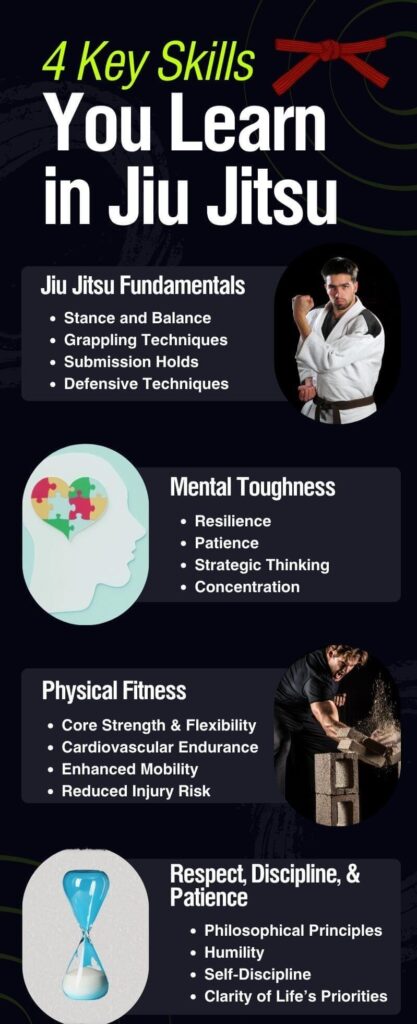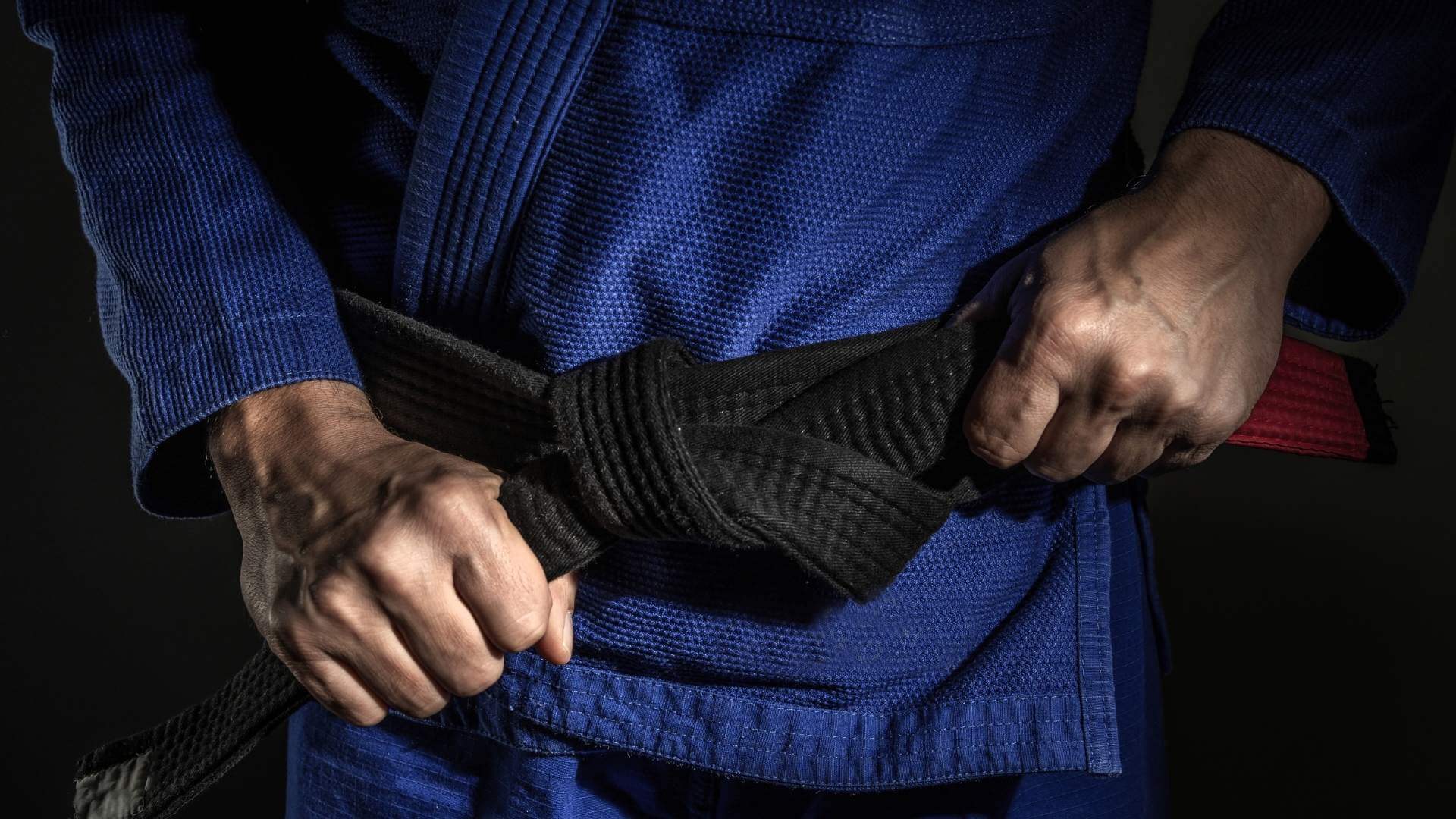Getting Jiu Jitsu training is more than mastering a collection of moves; it’s about embracing an experience that molds the body and mind. Once you explore martial arts, you’ll find that self-defense techniques are just the beginning.
The essence of BJJ learning transcends the dojo, seeping into every aspect of life by fostering resilience, strategic thinking, and a strong sense of community.
With each session, you engage in the grappling basics—the cornerstone of Brazilian Jiu Jitsu—not only to challenge your limits but to discover a form of self-expression that is uniquely yours. So, here are 4 Key skills Jiu Jitsu has to offer to every human being.

1. The Fundamentals of Self-Defense and Combat
Jiu Jitsu fundamentals are not just about fighting; they’re about understanding and applying a set of martial arts foundation principles designed to teach you harm prevention and how to react effectively when confronted.
Mastering Grappling Techniques
In the practice of self-defense in Jiu Jitsu, grappling skills are paramount. They provide the martial arts foundation that every practitioner builds upon. Grappling involves controlling an opponent through various Jiu Jitsu groundwork techniques, essential for gaining an advantage without necessarily resorting to brute strength. As a beginner, your focus will be on learning the basics:
- Proper stance and balance
- Maintaining control over your center of gravity
- Techniques for taking an opponent to the ground safely
- Positioning oneself in a way that maximizes leverage and control
Implementing Submission Holds
One of the core BJJ combat principles involves submitting opponents efficiently using a variety of holds. There are two primary types of submission holds in BJJ:
- Chokeholds: Applied to disrupt an opponent’s airflow or blood flow to the brain, making them temporarily unconscious if not released. It is very helpful in neutralizing hostile people without harming them.
- Joint locks: Targeting specific joints to create pain compliance or potential joint damage, prompting the opponent to submit.
Training will provide you with the skill set to execute these BJJ techniques and, equally important, the knowledge to escape or counter them if they are used against you.
Escaping Harmful Positions
Equally crucial to offensive maneuvers in Jiu Jitsu are the escaping techniques. Learning to escape from harmful or compromised positions is central to defensive tactics and overall harm prevention in martial arts. In your training, you’ll come to understand how to:
- Identify vulnerable positions
- Execute position recovery maneuvers
- Utilize movement and leverage to escape holds and locks
| Technique | Purpose | Key Benefit |
| Guard Recovery | Defensive maneuver to regain a neutral position | Prevents the opponent from moving to a more dominant position |
| Bridge and Roll Escape | Escape from the bottom position under an opponent | Creates an opportunity to reverse roles and gain control |
| Rear-Naked Choke Defense | Defend against one of the most common chokeholds | Teaches awareness of neck exposure and how to protect it |
Remember, while submission holds like chokeholds and joint locks are formidable, knowing the BJJ techniques to neutralize these threats and emerge unscathed encapsulates the essence of defensive Jiu Jitsu.
Your journey in BJJ will empower you with a comprehensive set of skills to engage proactively and disentangle defensively, reflecting this martial art’s dynamic and adaptive nature.
2. Developing Mental Toughness and Strategy
The mental fortitude required for success in Brazilian Jiu Jitsu (BJJ) goes beyond the physical. Mental toughness in martial arts is a cornerstone of your development as a practitioner, and BJJ provides the perfect crucible to forge this trait. Achieving psychological resilience becomes a central theme as you learn to navigate the complexities of fight psychology on the mats. Through grappling with the mental challenges presented by Jiu Jitsu, practitioners develop patience and the ability to execute BJJ strategies under pressure.
BJJ is frequently described as a form of physical chess, demanding that its practitioners anticipate their opponents’ every move. In this nuanced game of human puzzle-solving, having sharp mental acumen is just as important as physical prowess. Your journey towards psychological resilience is paved with tactical calculations, adaptive strategies, and a relentless pursuit of mental edge.
“BJJ is not just about being the strongest fighter in the room—it’s about being the smartest one.”
This adage rings true in how Brazilian Jiu Jitsu challenges you to outthink your opponent. It’s about making decisive moves, identifying patterns, and adjusting strategies in real time. BJJ strategies foster an environment where mental agility is prized and psychological resilience is tested. That’s why most experts suggest parents send their kids to kids Jiu Jitsu classes in their cities.
| Aspect of Mental Toughness | How BJJ Cultivates It | Impact on Performance |
| Resilience | Overcoming setbacks and defeats on the mat through continuous practice. | Increases the ability to bounce back during times of adversity in competition and training. |
| Patience | Learning to wait for the right moment to execute a move. | Develops a calculated approach to both offense and defense. |
| Strategic Thinking | Planning sequences of moves ahead and countering opponent’s strategies. | Enhances foresight and the ability to adapt swiftly to dynamic situations. |
| Concentration | Maintaining focus amid the physical and psychological stressors of a match. | Encourages a sharp and present mind essential for peak performance. |
Reflect on these mental skills as you continue to take to the BJJ mats. Notice how they evolve with your experience and empower your overall combat readiness. Remember, you can elevate your prowess in this esteemed martial art through the melding of physical training with mental endurance and the fine-tuning of fight psychology.
3. Enhancing Physical Fitness and Conditioning
Practicing Jiu Jitsu offers an extensive array of physical benefits. Regular practitioners experience a transformative impact on their bodies through martial arts conditioning, gaining strength and fostering overall well-being. Engaging consistently in BJJ training is not just about learning defensive tactics; it’s also an excellent means of enhancing physical health in BJJ, leaving you feeling revitalized and robust in everyday life.
Building Core Strength and Flexibility
The quest for improved core strength training finds a perfect ally in Jiu Jitsu. Vigorous training requires a solid core to execute movements effectively, from guard passes to complex sweeps. The development of this integral muscle group is tremendous, offering practitioners not just performance enhancement but also significant injury prevention benefits. Coupled with core strength, BJJ flexibility also plays a pivotal role, as maneuvering your body into various positions is essential for offensive and defensive techniques.
Let’s breakdown the physical benefits of Jiu Jitsu that revolve around core strength and flexibility:
- Core Stability: Essential for balance and maintaining positions.
- Enhanced Posture: A strong core translates into improved daily posture.
- Injury Prevention: A well-conditioned core and flexible body are less prone to common injuries.
Improving Cardiovascular Endurance
The dynamic and intensive nature of Jiu Jitsu training is exceptional for boosting cardiovascular health. Each roll or drill acts as endurance training, pushing your limits and enhancing your BJJ stamina. When you start taking Adult Jiu Jitsu Classes, practitioners will soon notice a marked improvement in their ability to sustain longer training sessions with quicker recovery times, underscoring the integral role of cardiovascular conditioning in martial arts.
Here are key highlights of the endurance-related advantages you can anticipate from your Jiu Jitsu routine:
- Sustained Energy: Higher cardiovascular capacity means more energy during rolls.
- Better Recovery: Your body learns to recuperate faster between rounds.
- Enhanced Threshold: Push past previous limits with improved overall stamina.
| Physical Attribute | Benefits of Jiu-Jitsu | Impact on Daily Life |
| Core Strength | Facilitates execution of complex BJJ techniques | Improves functional strength for everyday activities |
| Flexibility | Increases range of motion for techniques and transitions | Reduces injury risk and enhances mobility |
| Cardiovascular Endurance | Allows for more intense training with less fatigue | Supports heart health and boosts overall energy levels |
The “gentle art” of Jiu Jitsu nurtures your physical conditioning in multifaceted ways. With core strength training, improving BJJ flexibility, and enhancing cardiovascular health, you’re not just preparing for the mats but shaping a healthier, more robust version of yourself for life’s myriad challenges.
4. Understanding Respect, Discipline, and Patience
The core principles inherent in martial arts values are vividly present in the BJJ philosophy: respect for others, self-discipline, and patience in training shape the practitioner’s character as much as the physical techniques shape their capabilities. These non-tangible skills constitute the bedrock upon which Brazilian Jiu Jitsu classes are built.
Moreover, patience in training is considered a virtue that is often not highlighted enough. Incremental progress is a hallmark of Brazilian Jiu Jitsu, with each technique refined over countless hours of practice. Through BJJ, you quickly realize that some objectives take time and that delayed gratification leads to far richer rewards.
This patience, which intertwines with the nuanced learning process in the dojo, cultivates an outlook of persistence and long-term vision very much applicable in your daily life—from career aspirations to personal relationships.




